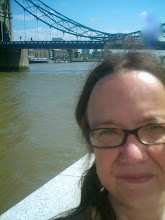 |
| Taken during my summer in England, 2012. |
As an actor I spent years (and I do mean years) getting inside other people's heads. I've played career-driven women, women with relationship issues, women hungry for power and women looking for love. I've even played a man with emotional troubles; the psychiatrist, Martin Dysart, in Peter Schaffer's classic play Equus. I learned a myriad of dialogue rhythms, from comedic to tragic to Shakespearean. I honed my comedy. I discovered how people react to different situations and how to portray that (both emotionally and physically) on stage.
As a director I had to 'look at the whole board' (to quote one of my favourite screenwriters) instead of concentrating on one specific piece. Some plays need to move at the speed of a spinning top; some benefit from a more lackadaisical rhythm, but all need to create their own unique worlds. Audiences can sniff out a false moment in an instant and their rustling and coughing are the symptoms of your failure.
But now, I write. Climbing inside each of my characters' heads and viewing the world through their eyes is second nature for me. I can know their vocabularies and their rhythms. Most importantly, I know what each of them want. In a play every scene has to move the plot forward and I try to apply this rule to my writing. Every unit has to either move the plot or let the reader learn something new about a character (or characters). I try not to have large descriptions of settings, unless it's vital to the plot. Many times it's the people and the events that are important, not the colour of the paint.
Every actor learns how to discover their character by answering the questions: What do I say about me? What do I say about others? What do others say about me? I suggest you take a look at whatever you're writing at the moment and answer it as each of your main and secondary characters. It may change how you view your characters or it may help you realize you're writing it exactly the way you want!
In the theatre instead of saying 'good luck' we say 'break a leg'. In that spirit, to all you writers I say 'break a pen or keyboard'.
 |
Elspeth Antonelli is an author and playwright. Her murder mystery games A Fatal Fairy Tale and Curiouser and Curiouser are among the top-selling mystery games on the internet. All thirteen of her murder mystery games and two audience-interactive plays are published by host-party.com. She has also contributed articles to the European writers' magazine Elias. Connect with her on Twitter at @elspethwrites or on Facebook at Elspeth Antonelli, Author. |


Since writing is SO much about the characters, this seems like a wonderful foundation.
ReplyDeleteTerry
Terry's Place
It certainly is for me!
DeleteI agree with the post 100 percent. My acting and directing experiences have helped me so much with writing. Even if folks don't want to get on stage, I recommend "playing" with the scenes as they are writing. It is surprising what can come of that. I am not always in my chair when I am writing. :-)_
ReplyDelete*applause*
DeleteWriters can learn a great deal from acting. I've read books on acting techniques to improve my craft. A writer must become each character in the story. I think by nature writers have a talent for acting, even if they are too terrified or uninterested in ever walking a stage.
ReplyDeleteI think acting and writing use many of the same creative muscles. And I don't think you have to be onstage to act!
DeleteI'm reading Alex Sokoloff's book right now. Screenwriting Tricks For Authors (and Screenwriters!) It's one of the most useful books I've read for working a story arc, and this post plays right into the concept.
ReplyDeleteHuzzah! Does that mean I get a call-back?
ReplyDeleteI love this holy triumvirate of questions, which are well worth lingering over:
ReplyDeleteWhat do I say about me?
What do I say about others?
What do others say about me?
If a writer would start right there, and explore fully—and experiment with how to give the reader access to this information even while limited to one point of view—half of the novel would be written! And in a much more interesting way than most writers dare to attempt.
Great post. Thanks for sharing.
ReplyDeleteWhen I was young, I did some acting; however, the stage wasn't for me. Working behind the scenes (or writing the screenplay or the book) is much more my style.
ReplyDeleteCharacterization, as noted here, crosses over quite nicely from the stage to the keyboard. Standing back and "watching" the story as a play or movie makes perfect sense and is practically guaranteed to raise the story up a notch or two when it migrates from the stage or screen to the keyboard. Great post, Elspeth!
According to my wife, the only stage experience I can claim is when I act like a jerk ... do you suppose that has had an impact on my fictional characters?
ReplyDeleteCongrats on your role in Equus! Thank you for this post. I've always know we can learn a great deal from movies and acting.
ReplyDelete“Climbing inside each of my characters' heads and viewing the world through their eyes is second nature for me.” – It’s a lot like stepping into the shoes of another. If the script says that you’re going to play a beggar, you should be a beggar. You can’t be an effective actor if cannot connect with your chosen role.
ReplyDelete